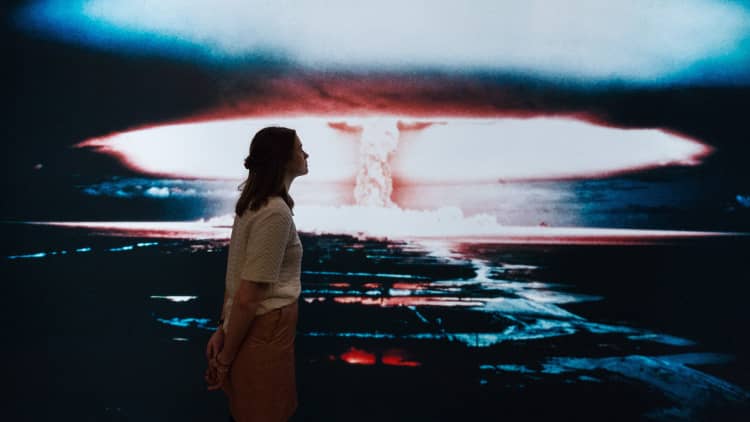
The White House faces a dearth of options to peacefully rein in an aggressive Pyongyang after the rogue nation warned late on Tuesday that it is seriously considering striking Guam.
In a statement carried by the state-run KCNA news agency, the North Korean army said it was "carefully examining an operational plan" for targeting the U.S. island territory with "enveloping fire" using the medium-to-long-range Hwasong-12 ballistic rocket.
If Washington wished to avoid military action, it should stop "recklessly" provoking Pyongyang, a separate statement from another military spokesperson said, according to KCNA.
The threat comes on the heels of a sharp warning from President Donald Trump earlier in the day. Pyongyang "will be met with fire, fury, and frankly, power, the likes of which this world has never seen before," Trump had said following a Washington Post report that claimed the pariah state was capable of building a miniaturized nuclear weapon.
Over the weekend, the United Nations hit North Korea with stinging sanctions that are expected to slash a third of its $3 billion export revenue following July's intercontinental ballistic missile tests.
Guam is far removed from the U.S. mainland. Credit: Google Maps
So far, Trump has responded to escalating North Korean threats by flying bomber jets over the Korean Peninsula, blasting China for failing to contain the renegade nation and testing the Terminal High Altitude Area Defense defense system.
Recent comments from U.S. officials have indicated frustration with diplomatic initiatives, implying a growing inclination for military operations.
In a recent statement, U.S. Ambassador to the United Nations Nikki Haley said "the time for talk is over." Following North Korea's July 4 launch, Haley warned that military procedures remained on the table. If required, the U.S. Pacific Air Forces stood ready to respond with "rapid, lethal, and overwhelming" force, General Terrence J. O'Shaughnessy said in a statement.
The U.S. has two options: either blow the head off the North Korean regime and deal with a collapse five times the size of the East German collapse or pointedly take out as many of these missile sites and nuclear facilities as possible.David RochePresident and global strategist at Independent Strategy
"I'm not sure the direction we're headed in is curbing tensions," Bruce Bennett, senior defense analyst at Rand, told CNBC. "If we're not going to negotiate, which seems to be what the [Trump] administration is saying, we're likely going to be taking actions — missile launchers, bomber overflies, and so forth — that will actually heighten tensions."
The White House has long expressed frustration with conventional policy measures to halt Pyongyang's nuclear ambitious, namely multilateral discussions and sanctions, instead suggesting the need for a more forceful approach. Earlier this year, Secretary of State Rex Tillerson publicly acknowledged that two decades of American efforts to denuclearize North Korea had failed.
"I don't believe there's any diplomatic solution that gets North Korea to give up its weapons," said Phillip Lipscy, assistant political science professor at Stanford University.
A military solution is now the primary scenario to deal with North Korea, added David Roche, president and global strategist at research firm Independent Strategy, who said he believes the West could launch a military strike on North Korea within six months.
"The U.S. has two options: either blow the head off the North Korean regime and deal with a collapse five times the size of the East German collapse or pointedly take out as many of these missile sites and nuclear facilities as possible," Roche told CNBC.

But such offensive measures present a worrying set of long-term consequences.
In fact, any kind of attack would likely lead to a major war, Bennett warned.
"The military option is very risky and costly," added Lipscy. "If they do undertake some kind of military action, you're talking about a potentially catastrophic situation with estimates upward of millions of casualties."
Ultimately, anything Washington does in this situation could trigger more conflict, Lipscy continued. "I don't really think there are any good options the U.S. can take here...there is no credible way the U.S. can defend against the kinds of things North Korea could do in retaliation to any U.S. action."
Instead of force, Bennett suggested Washington strategically play to North Korea's insecurities.
"North Korea is always sensitive to our efforts to affect its internal politics. Kim Jong-un was paranoid in killing his older half brother — he's worried about the survival of his regime, so we should be taking action to make him more worried to convince him that he has to be responsive to our concerns."

